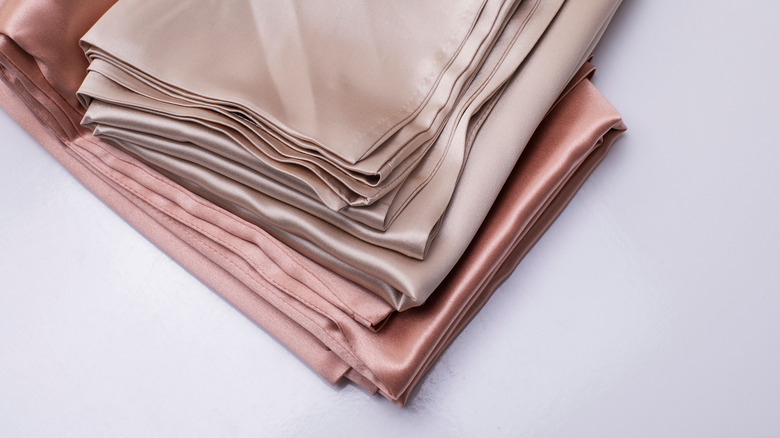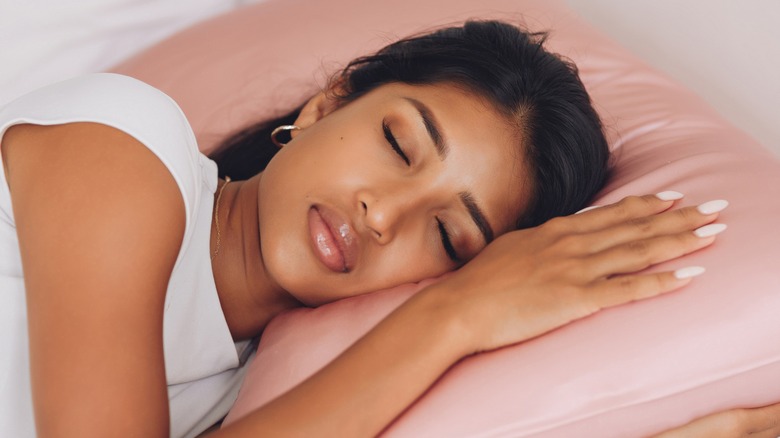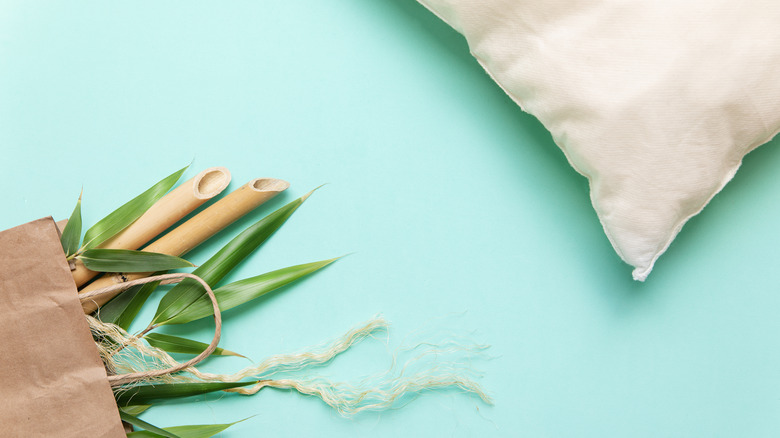Are Silk Pillowcases Worth The Hype?
If you love luxurious items, perhaps you have cashmere sweaters hanging in your closet, a leather armchair sitting in the living room, and gold accents adorning your home. Maybe you also have silk bedding on your bed. Silk is considered a luxurious material for a number of reasons, including its high manufacturing costs, explains Panaprium. The main reason? Silkworms spin this fabric, and the process of making a small amount is very pricey. It also takes a long time and has quite a few steps, including farming, weaving, bleaching, and coloring. All of this adds to the materials' highly-sought after reputation and expensive price tag, and many praise it for being soft, silky, and extra glamorous.
Perhaps, the expensive price tag has got you wondering if silk pillowcases are any better than typical cotton ones. Below, you'll discover the pros and cons of silk pillowcases, and then you'll find out if they are worth the hype.
The pros and cons
According to dermatologists on The Healthy, there are a number of benefits to using silk pillowcases. Many have claimed that they can create smoother hair and skin. These coverings absorb less moisture than cotton and other materials, so your skin can stay moisturized all night. Silk can also be especially beneficial to those with sensitive skin or acne, as it's not irritating and contains antimicrobials. Furthermore, the smooth surface helps reduce hair tangles, leading to less frizziness and breakage. Pleij Salon points out that this material is temperature regulating, which means it can feel cooling in the heat and warm in the colder season. It also reduces sleep lines and wrinkles while protecting brows and lashes.
However, silk pillowcases also have some notable cons, beginning with their price. While there are cheaper silk options, most cost more than their cotton counterparts. Additionally, Mulberry Park Silks points out that some materials are mislabeled as silk when made of polyester or satin. This textile is also more difficult to care for, as it needs to be washed alone on a gentle cycle with cold water and hung to dry. Lastly, silk can also fade if placed in the sunlight.
Are they worth the hype?
However, despite all the cons, most agree that silk pillowcases are worth the hype. Those who want skin and hair advantages while feeling luxurious will benefit from these pillowcases. According to Hairlust, they are especially great for those who have allergies, dry skin, sensitive skin, and textured hair. Nevertheless, they're only worth the hype if they are of good quality. Dr. Markowitz, a dermatologist, says to make sure your pillowcase is made from the best materials, look at the momme weight, per The Healthy. The skin expert explains, "The higher the momme weight, the better, as this means a greater amount of silk was used during the weaving process. A good rule of thumb when shopping for a pillowcase is to select a momme weight in the high teens or low 20s. Anything super low is not as durable and is more prone to tearing."
Additionally, vegans or those conscious of animal treatment may not think these pillowcases are worth it, as hundreds of thousands of silkworms are killed to make silk every year, per Panaprium. Further, this fabric is produced with minimal environmental standards; some may use sweatshop labor to produce these materials. If you're looking for an alternative, Hairlust suggests choosing bamboo pillowcases. Compared to silk, bamboo is very sustainable, as it grows quickly. Bamboo is also more breathable than tightly woven silk and is much more durable.


